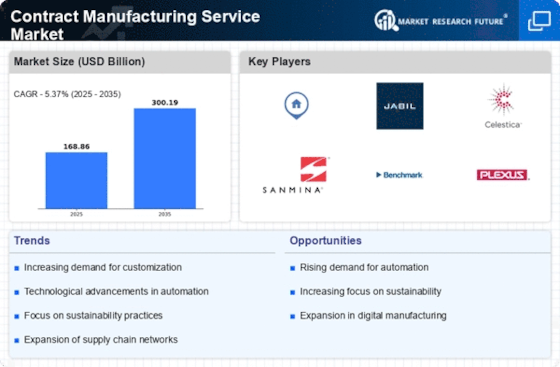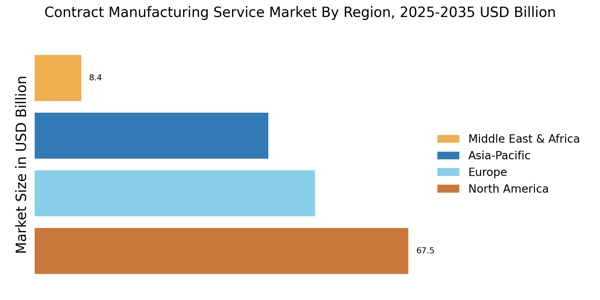Expansion of E-commerce
The expansion of e-commerce is significantly influencing the Contract Manufacturing Service Market. With the rise of online shopping, businesses are increasingly relying on contract manufacturers to fulfill their production needs efficiently. E-commerce platforms require rapid turnaround times and scalable production capabilities to meet fluctuating consumer demands. Recent statistics indicate that e-commerce sales have surged, with projections suggesting a continued upward trajectory. This growth necessitates a robust supply chain, prompting companies to partner with contract manufacturers who can provide the agility and responsiveness required in this dynamic environment. Consequently, the Contract Manufacturing Service Market is poised for substantial growth as e-commerce continues to reshape consumer purchasing behaviors.
Focus on Cost Efficiency
Cost efficiency remains a critical driver in the Contract Manufacturing Service Market. Companies are increasingly seeking ways to reduce operational costs while maintaining product quality. By outsourcing manufacturing processes to contract manufacturers, businesses can leverage economies of scale and specialized expertise, resulting in significant cost savings. Recent analyses suggest that companies can reduce production costs by up to 25% through strategic partnerships with contract manufacturers. This focus on cost efficiency allows businesses to allocate resources more effectively, invest in research and development, and ultimately enhance their competitive positioning. As a result, the Contract Manufacturing Service Market is likely to witness sustained growth as companies prioritize cost-effective solutions.
Technological Integration
Technological integration is a pivotal driver within the Contract Manufacturing Service Market. The adoption of advanced technologies such as automation, artificial intelligence, and the Internet of Things is revolutionizing manufacturing processes. These technologies enhance efficiency, reduce production costs, and improve product quality. For instance, the implementation of automation in manufacturing has been shown to increase productivity by up to 30%. As companies strive to remain competitive, the integration of these technologies becomes essential. This trend not only streamlines operations but also enables contract manufacturers to offer innovative solutions to their clients, thereby fostering growth in the Contract Manufacturing Service Market.
Rising Demand for Customization
The Contract Manufacturing Service Market is experiencing a notable rise in demand for customized products. Companies are increasingly seeking tailored solutions to meet specific consumer preferences and market trends. This shift towards customization is driven by the need for differentiation in a competitive landscape. According to recent data, approximately 70% of consumers express a preference for personalized products, prompting manufacturers to adapt their offerings. As a result, contract manufacturers are investing in flexible production capabilities to accommodate these unique requirements. This trend not only enhances customer satisfaction but also fosters brand loyalty, thereby propelling growth within the Contract Manufacturing Service Market.
Regulatory Compliance and Quality Standards
Regulatory compliance and adherence to quality standards are paramount in the Contract Manufacturing Service Market. As industries face increasing scrutiny regarding product safety and quality, manufacturers must ensure that their processes align with stringent regulations. This necessity drives companies to collaborate with contract manufacturers who possess the expertise to navigate complex regulatory landscapes. Compliance with international standards not only mitigates risks but also enhances brand reputation. Recent data indicates that companies prioritizing quality assurance experience a 20% increase in customer trust and loyalty. Therefore, the emphasis on regulatory compliance is likely to propel growth within the Contract Manufacturing Service Market as businesses seek reliable partners to meet these critical requirements.

















